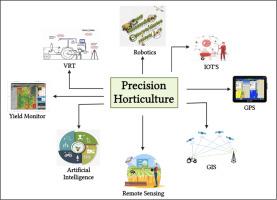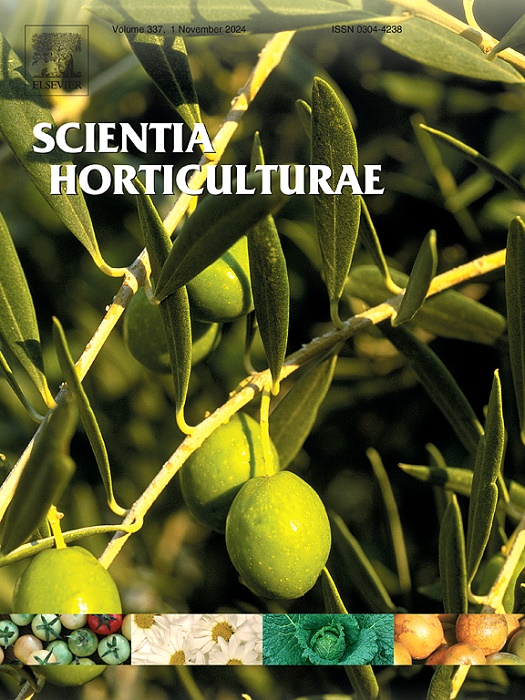驾驭精准园艺:数字时代的可持续农业
IF 3.9
2区 农林科学
Q1 HORTICULTURE
引用次数: 0
摘要
自动化、自主化和精确化在现代技术和程序中发挥着至关重要的作用,尤其是在应对全球人口增长和对改进水果生产技术的需求方面。水果产量的质量标准日益复杂,需要从根本上进行升级。基于传感器的技术为更合理、更高效地利用土壤铺平了道路。精准农业是一种先进的农业方法,它利用软件技术和原理来优化园艺生产的各个方面。其目标是通过管理空间和时间变化,提高作物产量,促进环境的可持续发展。精准园艺是一种先进的耕作方法,其重点是提高作物产量和质量,同时最大限度地减少对环境的影响。这种方法利用先进技术和数据驱动决策。通过利用传感器、机器人、无人机和其他创新工具进行产量测绘、灌溉控制、机器人收割、养分和农药施用、土壤传感和作物生长分析,种植者可以监测植物生长和健康状况,发现潜在问题,并做出明智的作物管理决策。根据植物的具体需求进行调整,可以提高产量、改善产品质量并减少对环境的影响。总之,精准园艺在满足日益增长的粮食生产需求的同时,为促进可持续农业实践带来了巨大希望。本文章由计算机程序翻译,如有差异,请以英文原文为准。

Navigating the landscape of precision horticulture: Sustainable agriculture in the digital Age
Automation, autonomy, and precision play vital roles in modern technology and procedures, especially in response to the rising global population and the need for improved fruit production technologies. The quality criteria for fruit yield are becoming increasingly complex, necessitating fundamental upgrades. Sensor-based technologies pave the way for more rational and efficient soil usage. Precision farming, an advanced agricultural approach, employs software technologies and principles to optimize various aspects of horticultural production. Its goal is to enhance crop yields and promote environmental sustainability by managing spatial and temporal variations. Precision horticulture, a cutting-edge farming method, focuses on increasing crop yields and quality while minimizing environmental impact. This approach leverages advanced technology and data-driven decision-making. By utilizing sensors, robots, drones, and other innovative tools for yield mapping, irrigation control, robotic harvesting, nutrient and pesticide application, soil sensing, and crop growth analysis, growers can monitor plant growth and health, identify potential issues, and make informed crop management decisions. Tailoring practices to specific plant needs can lead to higher yields, improved product quality, and reduced environmental impact. Overall, precision horticulture holds significant promise for promoting sustainable agricultural practices while meeting the increasing demand for food production.
求助全文
通过发布文献求助,成功后即可免费获取论文全文。
去求助
来源期刊

Scientia Horticulturae
农林科学-园艺
CiteScore
8.60
自引率
4.70%
发文量
796
审稿时长
47 days
期刊介绍:
Scientia Horticulturae is an international journal publishing research related to horticultural crops. Articles in the journal deal with open or protected production of vegetables, fruits, edible fungi and ornamentals under temperate, subtropical and tropical conditions. Papers in related areas (biochemistry, micropropagation, soil science, plant breeding, plant physiology, phytopathology, etc.) are considered, if they contain information of direct significance to horticulture. Papers on the technical aspects of horticulture (engineering, crop processing, storage, transport etc.) are accepted for publication only if they relate directly to the living product. In the case of plantation crops, those yielding a product that may be used fresh (e.g. tropical vegetables, citrus, bananas, and other fruits) will be considered, while those papers describing the processing of the product (e.g. rubber, tobacco, and quinine) will not. The scope of the journal includes all horticultural crops but does not include speciality crops such as, medicinal crops or forestry crops, such as bamboo. Basic molecular studies without any direct application in horticulture will not be considered for this journal.
 求助内容:
求助内容: 应助结果提醒方式:
应助结果提醒方式:


